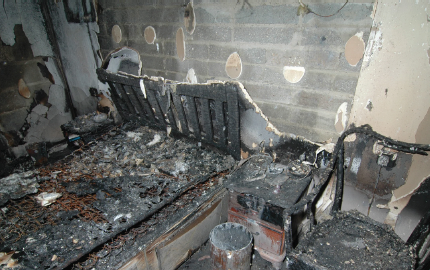BRE expert shares how personal protection systems can reduce fire risk
Are you responsible for vulnerable people? BRE’s Nigel Firkins explains more about safeguarding your charges.
A Personal Protection System (PPS) is a local application watermist fire suppression system targeting individuals to specifically protect from the threat of fire. These systems were developed in response to analysis of fatal fires in dwellings, where many victims had physical and/or mental health impairment. The analysis showed that vulnerable groups are at higher risk from fire in their homes. Signs of “near miss” incidents such as smoke alarms regularly sounding or burn damage on clothing, bedding and furniture should not be ignored. Especially as vulnerable people are unlikely to easily escape without assistance, heightening the need for extra protection. To assist in understanding and reducing fire risk to vulnerable people, BRE Global and the London Fire Brigade have jointly published “Guidance on the use, deployment and limitations of Personal Protection Watermist Systems in the homes of vulnerable people.”

BRE Global introduced a Loss Prevention Standard to provide evidence-based assurance about Personal Protection Systems. LPS 1655 covers the requirements and test methods for the LPCB approval of personal protection watermist systems.
LPS 1655 contains, system design requirements, including minimum levels of performance and functionality, system manual and installer requirements, fire test protocols, maintenance arrangements and covers component examination and testing. It also provides a mechanism for on-going production checks on PPS systems and components by regular Factory Production Control audits and through an ISO 9001 quality management system.

PPS are designed to be quickly and easily deployed in the home of a vulnerable person, potentially within a short time of the risk being identified. Generally, the systems can be delivered to site, filled with water from a tap, plugged into the mains and be providing protection within a few hours.
In a recently reported case study, an LPS 1655 approved Ultraguard PPS supplied by a UK Fire and Rescue Service in partnership with a local authority mental health charity, prevented a potentially life-threatening fire. The system had been installed in the home of a vulnerable resident and activated when a discarded cigarette started a fire in a waste bin. Not only did the PPS suppress the fire, but the Fire and Rescue Service were automatically alerted, allowing fire engines to be immediately despatched. When the firefighters arrived, they found that the fire had been extinguished by the PPS.
Personal Protection Systems reduce the level of fire risk faced by vulnerable people with mobility difficulties. LPS 1655 is a significant step forward in providing a third-party approval standard to give confidence about the design, performance and reliability of these system in practice. If you would like further information about the LPS 1655 scheme then please email us at enquiries@bregroup.com or call us on +44 (0)333 321 88 11.
Read Nigel’s full article in the February 2019 issue of Fire & Risk Management* which gives guidance to ensure correct deployment of these potentially lifesaving Personal Protection Systems. * Please note that membership is required for full access to F&RM.
